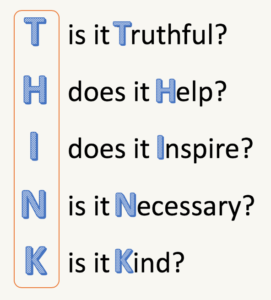Responsible use of social media at a time of COVID-19
Most of us are anxious to share information on social media. It is tempting to forward messages with a click of a finger. But false and misleading information may have serious consequences for our lives. It leads to fear, anger, inaction, bigotry or even worse. You can be more mindful about your use of social media and still enjoy staying in touch with friends and family members.
THINK twice before posting or sharing on social media. Ask yourself:

 Pay attention to:
Pay attention to:
- Sourcing
Is the source identified? Can you judge for yourself if it’s reliable? How do you know it is reliable? Is the source a government official, a credible medical or scientific organization or another news report?
- Images
Be wary of images that aren’t credited and images lacking context, and those clearly doctored. Ask yourself if this is from a trustworthy source such as mainstream press or credible organizations such as the WHO or your government or the local public health department.
Modern editing technology has made it easy for people to create fake images that look professional and real. In fact, research shows that only half of us can tell when images are fake. However, there are some warning signs you can look out for: strange shadows on the image, for example, or jagged edges around a figure.
- Check That It “Sounds Right”
Use your common sense! If a posting sounds unbelievable, it probably is. Bear in mind that fake information or news is designed to “feed” your biases or fears. And, remember, just because a story sounds “right” and true, doesn’t mean that it is.
- Develop a Critical Mindset
Ask yourself, “Why has this message been posted? Is it to persuade me of a certain viewpoint? Is it selling me a particular product? Or is it trying to get me to click through to another website?”
- When in Doubt, Leave it Out
There’s no need to rush headfirst into posting anything. Take a breath and think it all through. If you have a doubt about the sources or the information either rethink what you wanted to say, or don’t say anything.
- Be the weak link
Remember, you may be unknowingly contributing to the spread of false information forwarding anything and everything you receive. If you do not forward it, then it is unlikely that anyone in your network will. Don’t forward!
Sources:
https://smartsocial.com/using-social-media-responsibly/
https://iowacity.momcollective.com/2018/06/29/responsible-sharing-social-media/
https://honestreporting.com/5-tips-sharing-news-responsibly-social-media/
